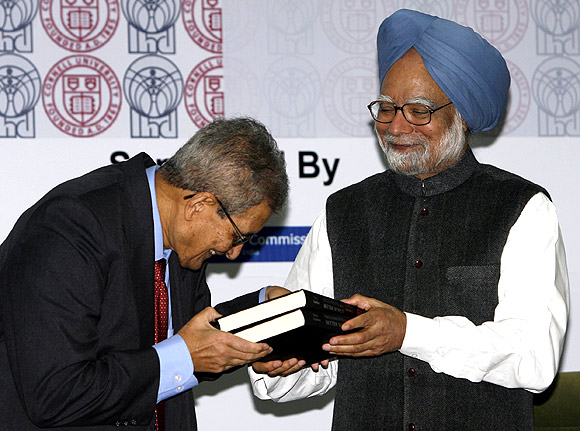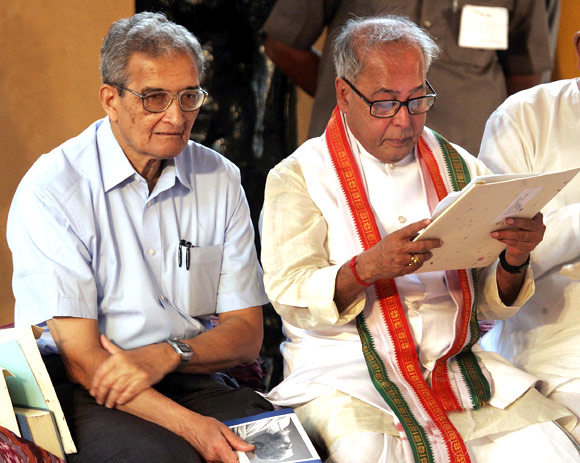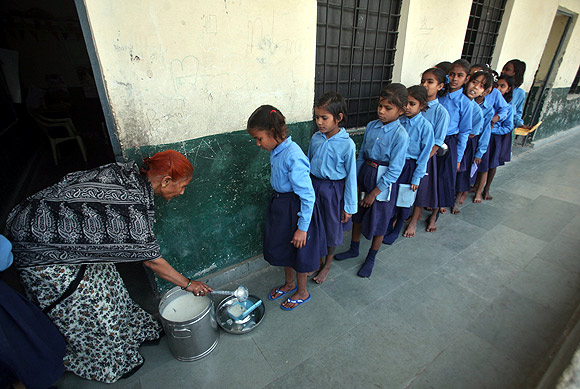Photographs: Adnan Abidi/Reuters
Amartya Sen -- Nobel Laureate, former Master of Trinity College in Cambridge and Thomas W Lamont University Professor at Harvard University -- has squarely rejected the notion of using an indefinite fast as a tool to eradicate corruption.
In an interview with CNN-IBN, the Nobel laureate said that instead of fasting and protesting, one should try and change the economic systems that provide incentives for corruption.
On Anna Hazare: "I believe that their reading of corruption or what causes corruption or how it can be removed is wrong. We have to look at how the economic system operates.
"I have a lot of sympathy for him. I am not lacking sympathy for getting absolutely maddeningly angry about the extent of corruption. I think what we have to look at is the understanding of the system. It gives incentive to corruption. That needs changing but that's not a question of changing a minister or doing a dharna or someone being tied up to a tree for having abused someone or having gone against some rule.
"It's a question of changing this system appropriately and looking at the incentive. Could it be that someone says I want corruption? The question is how to eliminate it and for that you need to understand the causation. So, it's not an issue about whether you want corruption. That's not what the debate is about. It's what causes corruption. What are the systematic errors? What requires changing and why do we have so much incentive given for corruption?"
Click on NEXT for more...
'He is a very fine economist'
Image: Amartya Sen with Prime Minister Manmohan SinghPhotographs: B Mathur/Reuters
On Manmohan Singh:
"Well, you know how much a PM can do in a democratic system is of course determined by the forces with which he has to reckon with. About Manmohan Singh, he is a very fine economist, of course, you would like that reputation to remain which has remained.
"If there is any question it is if he is a great political figure or not and I think he has certainly been one, if you think about what he has achieved in enormous amounts. Not only the fastest period of but the longest period of Indian growth has been under his prime ministership.
"What we have to look at is not so much his image, because I think that's not what he will be mainly concerned with, but whether he is doing well for the country. For that, yes there are things to do. You have to mobilise the political system because you know democracy is meant to be governed by discussions. Instead of that, what we have ended up in India is government by pressure groups and the pressure groups are very sour. When Manmohan tries to do something to provide employment or to make food items cheaper for the very poor, people immediately jump into the idea and say you are fiscally irresponsible."
Click on NEXT for more...
'I think chasing fast growth alone is a mistake'
Image: Amartya Sen with former Finance Minister and President Pranab MukherjeePhotographs: Jayanta Shaw/Reuters
On whether chasing fast growth is stupid:
"I didn't say that. I was misquoted like so many others. I said chasing fast growth alone is stupid. It's like saying eating vitamins alone is a mistake -- but you said eating vitamin is a mistake. I didn't say that; I think chasing fast growth alone is a mistake. Growth is important because it actually does something for us.
And use the fruits of growth and see that it reaches people. Also, use the public resources generated by fast growth for remedying the huge problem of educational underdevelopment, underdevelopment of elementary health care and bad physical infrastructure. All those we have to deal with, that's what we have to look at.
"That doesn't make me anti-growth because growth helps, certainly. But single-minded worship of growth is no way of getting to the things which we really care about, namely what is good for Indian people."
Click on NEXT for more...
'Quality cannot be diluted'
Image: Children stand in line to collect their free mid-day mealPhotographs: Parivartan Sharma/Reuters
On higher education:
"We are very keen on excellence. Quality cannot be diluted in the way it has happened in a number of Indian institutes. Any kind of higher education requires a kind of elitist guardianing."
"The basic education system should be very good and solid. So that people from all classes can come and have the opportunity of elitism. But when your school system is very limited, half the people don't even get proper primary education. People drop out from good secondary education and the opportunity of that elitism becomes rarer".
"Yes, we do want elitism, provided it is open and that requires the basic structure of education to be enormously improved."
Click on NEXT for more...





article